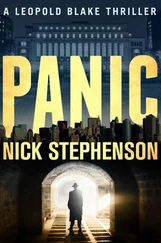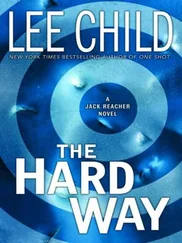Nick Stephenson - Eight the Hard Way
Здесь есть возможность читать онлайн «Nick Stephenson - Eight the Hard Way» весь текст электронной книги совершенно бесплатно (целиком полную версию без сокращений). В некоторых случаях можно слушать аудио, скачать через торрент в формате fb2 и присутствует краткое содержание. Жанр: Старинная литература, на английском языке. Описание произведения, (предисловие) а так же отзывы посетителей доступны на портале библиотеки ЛибКат.
- Название:Eight the Hard Way
- Автор:
- Жанр:
- Год:неизвестен
- ISBN:нет данных
- Рейтинг книги:5 / 5. Голосов: 1
-
Избранное:Добавить в избранное
- Отзывы:
-
Ваша оценка:
- 100
- 1
- 2
- 3
- 4
- 5
Eight the Hard Way: краткое содержание, описание и аннотация
Предлагаем к чтению аннотацию, описание, краткое содержание или предисловие (зависит от того, что написал сам автор книги «Eight the Hard Way»). Если вы не нашли необходимую информацию о книге — напишите в комментариях, мы постараемся отыскать её.
Eight the Hard Way — читать онлайн бесплатно полную книгу (весь текст) целиком
Ниже представлен текст книги, разбитый по страницам. Система сохранения места последней прочитанной страницы, позволяет с удобством читать онлайн бесплатно книгу «Eight the Hard Way», без необходимости каждый раз заново искать на чём Вы остановились. Поставьте закладку, и сможете в любой момент перейти на страницу, на которой закончили чтение.
Интервал:
Закладка:
Shooting up Valencia to catch 101, I wove exuberantly through light traffic past the Palace of Fine Arts, then crossed the old Presidio onto the Golden Gate Bridge. This early the breeze was gusty and the night’s fog clearing, the day promising to be misty at sea level beneath brooding overcast until the night fog rolled back in.
Five miles later I reached Mill Valley, a Marin suburb now very green with recent rains. My GPS brought me to a house at the edge of the flat older section of town, where the road just started to crawl upward into the low hills above. The dwellings I saw there were a bit smaller and more aged than those perched above, meaning they could be had for under a million. The higher the view, the higher the price. I glanced at a monstrosity at the top that had to cost at least ten.
Driving past the address without staring, I flicked the GPS off to stop the cheery canned voice from complaining. I cruised the neighborhood looking for obvious signs of surveillance—delivery vans or small RVs parked on the street, large dark American sedans with suits in them, or houses with blinds lowered but rotated open. Nothing jumped out at me, so I parked around the corner at the end of the block.
Fortunately an unusual vacant lot bearing signs of local kids and their BMX habits allowed me to access the back gate of the Sorkin home without too much trouble, via a footpath that wended its way behind the houses. This arrangement was odd but not unknown, especially in older developments built under liberal or nonexistent zoning laws.
It looked like these places had been individually constructed in the 1950s to house the Greatest Generation as they rebuilt postwar America, and had been renovated many times since, creating a patchwork of styles. Pseudo-Spanish architecture abounded—Sorkin’s was one of those—but I also spotted Cape Cod, Colonial and several variants on mid-century modernism.
In short, typical coastal California.
The state, not me. Sorry, is that joke getting old?
I pushed on the back gate of the weathered wooden six-foot privacy fence and slipped inside, pushing it to. The yard I saw teemed lush and had begun sliding into overgrown, as if neglected for months. No swimming pool—the coast range towns were too cold from the Pacific breezes to make that feature de rigeur . Mark Twain had famously said, “The coldest winter I ever spent was a summer in San Francisco,” which applied to Marin County as well.
Movement behind the kitchen window made me pick my way up the garden path toward the back door, where I met a Caucasian woman not too different in build from myself. With unwashed hair and housecoat, bloodshot eyes and shaky hands, she looked like hell.
Without speaking, she took my arm and pulled us toward a small, separate building.
Opening a door, the woman motioned us into what turned out to be the house’s separated one-car garage. It smelled of automobile and dust. Shutting the portal behind, the woman flipped on the bare-bulb light above a nondescript Toyota sedan, and then let out a sigh of relief. “Thank you for coming, Ms. Corwin. I’m Mira Sorkin.” She clutched my right hand as if drowning, and then let go suddenly, confused at my lack of grip.
It hardly bothered me anymore, people’s reactions. Best to get it over with. I brushed the hair back on my right side, revealing the scars that the reconstructive surgery hadn’t been able to completely banish. I’d had my jawline bob cut to fall over them, and with a bit of makeup I could conceal where they crept into the open along my jawline.
Mira’s surprise flattened out with the smoothing of her face. I ignored the other woman’s emotions by dint of long practice. “Bomb,” I said curtly, holding up my right hand and flexing it. “I was lucky. This hand’s a bit weak, but the blast didn’t even damage my eye.”
“Oh, I’m sorry.” Mira froze, as if not sure what to be sorry about, or how to act. “I suppose in your business...”
My business? I wondered if Mira thought all PIs encountered bombs, or should be damaged goods. Maybe Cole had told her I had been a cop, “my business,” or that the PI trade was shady. Maybe that’s what she meant. Well, she wasn’t far wrong, I suppose.
“It’s fine, really,” I repeated. “Can’t even tell with my hair in place. Got some ID?”
“What?”
“ID. I like to know for sure who I’m talking to.”
“Oh...not on me. Inside.”
I grunted in irritation. “Okay, later. Why are we in the garage?”
“I can’t be sure the house isn’t bugged.”
“Then why don’t we go somewhere else?”
Mira pulled a cordless handset out of her housecoat pocket. “I have to stay by my home phone.”
It appeared Mira would say more, but I held my hand out for the cordless and examined it briefly before pulling out a multi-tool from my belt. “Let’s make sure this isn’t bugged either, otherwise we’re in here for nothing.”
After opening it up, I shook my head, screwed it back together and handed it to Mira. “Nope. It’s clear. Now what’s this all about?”
Mira shuddered and breathed deeply in and then out. Her exhalation sent the sharp sour smell of alcohol wafting under my nose. “My daughter was kidnapped two days ago.”
Hairs rose on the back of my neck as my cop sense woke up with a surge of adrenaline. I had expected some kind of marital dispute, even a custody battle, not capital crimes for breakfast. And Mira had been so calm on the phone.
If it was my daughter I’d have been climbing the walls.
I wiped the leg of my jeans off where I’d brushed the Toyota in the close confines of the small garage. “Mira, let’s go inside. I’ll check for bugs in your house,” I said, pulling out the sniffer and holding it up, “and maybe I could trouble you for a bagel or something. I came right over after our call and I think better with some calories in me.”
“Of course, of course.” Mira retraced her steps, leading us through the back yard.
“Remember, don’t speak until I give you the all-clear.”
Once we’d made our way into the house, Mira poured mugs of coffee and dropped two bagels into the toaster, puttering around as if lost. The interior of the house showed off the latest look, the kitchen had high-end counters, cabinets and appliances, and the coffee dripped from a machine that probably cost more than a set of rally tires.
It smelled heavenly.
So Mira was comfortably off. I tried to figure how much I could charge and not feel guilty, reminding myself that “a workman is worthy of his wages.” Even after two years off the force it was hard to charge people money to help them, but I had a business to run and bills to pay.
While Mira puttered, I ran the sniffer over the kitchen and nook, then the living room, working outward.
Nothing.
A less thorough check of the three-bedroom upstairs made me reasonably sure that no microphones lurked. Someone might be wiretapping the phone line on the way out, or there might be one of any number of devices attached to the computer in the corner, but at least it seemed we didn’t have to worry about just talking.
I did see pictures of Mira and a girl, taken within the last ten years, in various settings. I recognized a couple of local landmarks—the carousel at Fisherman’s Wharf, the observation deck of Coit Tower, the Alcatraz dock. As I looked at the photos, nowhere did I see a man, or anybody else that might be family.
The father must be out of the picture, I thought with an internal smile at the wordplay. Gone, rather than dead. People didn’t excise the dear departed from their memorabilia, only those they didn’t like anymore.
Or I supposed he could have just been a donor. Unusual, but not unknown.
Читать дальшеИнтервал:
Закладка:
Похожие книги на «Eight the Hard Way»
Представляем Вашему вниманию похожие книги на «Eight the Hard Way» списком для выбора. Мы отобрали схожую по названию и смыслу литературу в надежде предоставить читателям больше вариантов отыскать новые, интересные, ещё непрочитанные произведения.
Обсуждение, отзывы о книге «Eight the Hard Way» и просто собственные мнения читателей. Оставьте ваши комментарии, напишите, что Вы думаете о произведении, его смысле или главных героях. Укажите что конкретно понравилось, а что нет, и почему Вы так считаете.











